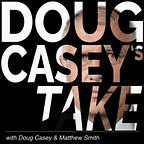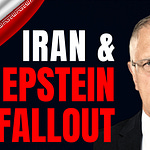How do we make sense of all the disorder in the world today?
And Is there a “they”?
In this conversation with Alex Krainer we attempt to get to the heart of the problem plaguing the world today. If you aren’t already a subscriber to Alex’s excellent and free newsletter, subscribe here.
Time stamps:
The clash between two systems of governance [00:02:10]
Alex Krainer discusses the clash between what Soros defines as “open societies” and “closed societies”, and how it has been ongoing for more than 2000 years.
The conflict between ruling oligarchies and the rest of humanity [00:03:41]
Krainer explains how ruling oligarchies in the West have historically created misery at home and mayhem abroad, with a narrow vested interest in the moneylender class.
Russia and China as the "good side" [00:07:18]
Krainer argues that Russia and China are the good side in the current global conflict, contrasting their histories with Western empires and their lack of colonization and invasion.
China's intentions towards the United States [00:11:56]
Alex discusses the lack of reason to believe that China has any intention to harm the United States and questions why they would choose to invade the United States instead of other countries.
The unique characteristics of Western civilization [00:14:23]
Doug lists 12 characteristics of Western civilization that he believes are unique to it, including free thought, free speech, free markets, and individualism.
The origin of central banking [00:19:08]
Alex discusses the origins of central banking, mentioning the Venetian bank as a possible first central bank and the establishment of the Bank of England as the first true central bank.
The importance of surplus labor and social capital [00:24:39]
Discussion on how surplus labor in settled communities allows for the creation of social capital and investment in community projects.
The role of bankers in allocating credit [00:27:23]
Exploration of how bankers can control the allocation of credit and investment, potentially diverting resources away from community desires.
The facade of freedom of speech in Western civilization [00:29:51]
Analysis of how freedom of speech is limited and controlled in Western societies, with examples of censorship and deplatforming.
The deteriorating social infrastructure [00:36:05]
The speaker discusses how the social infrastructure in their country has deteriorated, including issues with the water supply, trash, and postal system.
The need for monetary system reform [00:37:18]
The speaker argues that the monetary system needs to be reformed in order to address the wealth inequality and ensure credit allocation aligns with community needs.
Two ways to end the current system [00:42:19]
The speaker explains that there are two possible outcomes to address the current system: a deflationary death spiral or using the central bank to issue credit and potentially trigger hyperinflation.
Preparing for a crisis [00:47:33]
Advice on acquiring gold and silver, having enough savings to cover expenses, and owning land for self-sufficiency.
Building community resilience [00:48:48]
The importance of reaching out to local communities, cultivating bonds of trust and mutual support for resilience during a crisis.
Chances of a police state [00:49:23]
Discussion on the likelihood of the US and EU turning into police states, highlighting the differences in democracy and government accountability.
Alex’s Take on The Great Taking [01:03:56]
Discussion on the possibility of a rug pull in the financial system and the risks involved.
The option of printing fiat to infinity [01:01:04]
Exploring the option of central banks printing unlimited amounts of fiat currency to manage economic crises.
Solution to the Oligarch problem [01:05:23]
They should get exactly what they want for us.











